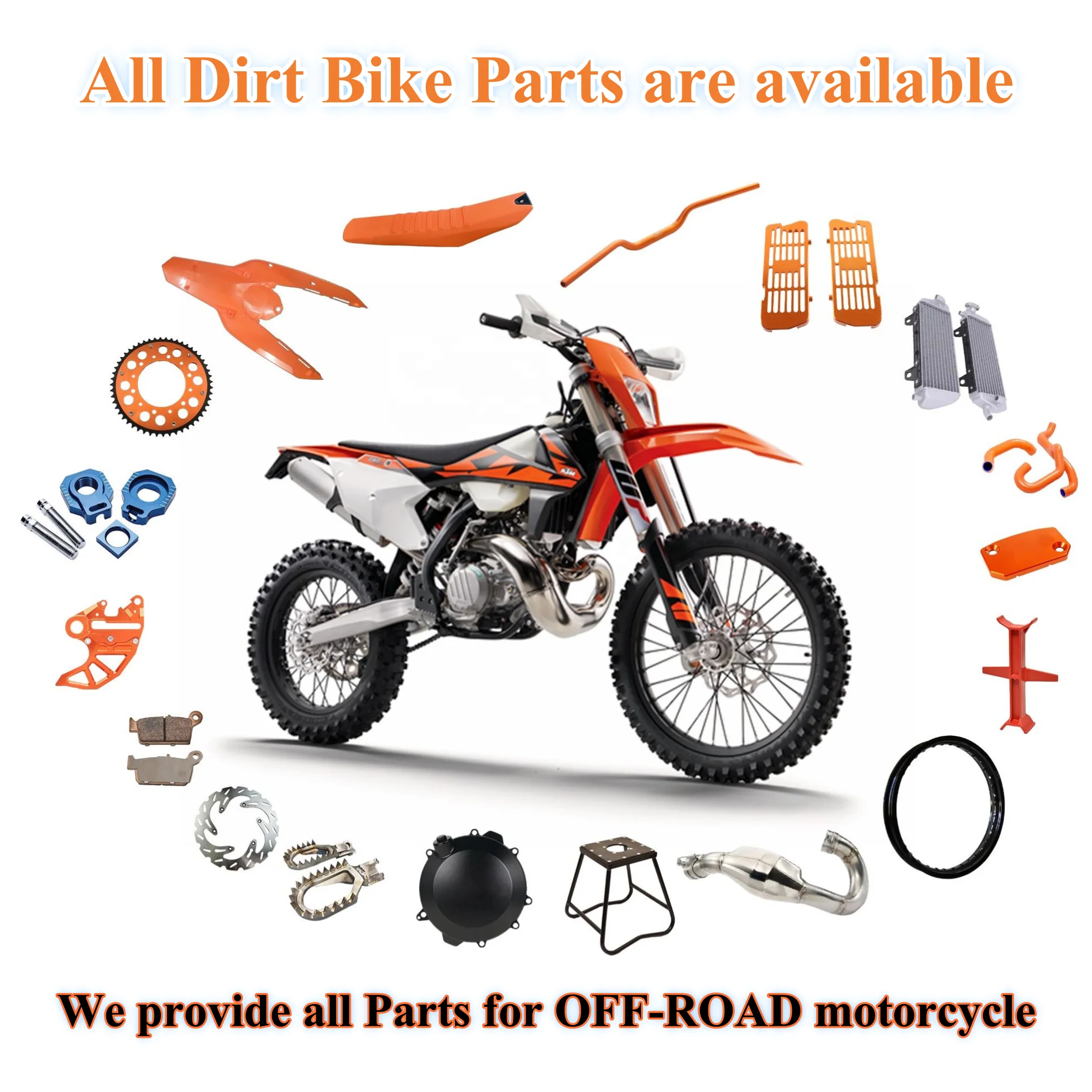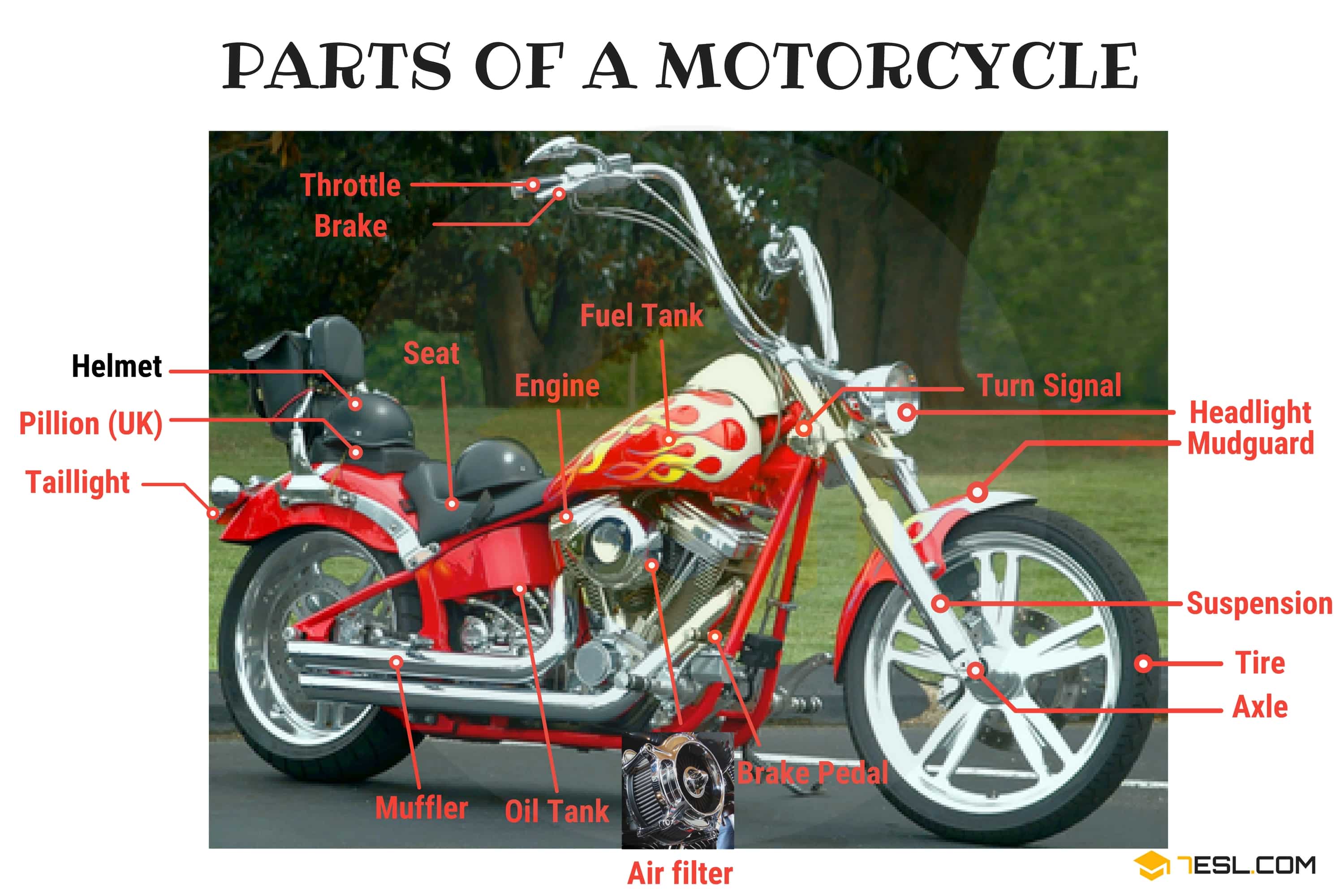Discover the Essential MotorBike Components You Need for Optimal Efficiency
Understanding the important parts of a motorcycle is fundamental for attaining peak performance. Each element, from the engine to the stopping system, plays a vital duty in general capability and safety. Normal maintenance can prevent unanticipated failures and enhance the riding experience. Numerous motorcyclists ignore the ins and outs of these systems. Uncovering just how they function with each other can cause an extra efficient ride. What important parts should every biker focus on?
The Engine: The Heart of Your Bike
The engine offers as the core part of a motorbike, driving its efficiency and defining its abilities. It is accountable for converting gas right into power, which powers the bike forward. Numerous kinds of engines are used, including single-cylinder, V-twin, and inline configurations, each offering unique characteristics matched for various riding designs and functions. The engine dimension, typically measured in cubic centimeters (cc), substantially influences performance, with bigger engines generally giving even more power and torque.Furthermore, the engine's layout and innovation, such as gas injection systems or air-cooling versus liquid-cooling, influence effectiveness and integrity. Maintenance is important for peak procedure; elements like regular oil modifications and checking ignition system assurance long life. Cyclists typically think about an engine's responsiveness and level of smoothness, as these characteristics improve the total riding experience. Ultimately, the engine remains a critical element that defines not just the motorbike's efficiency but additionally the cyclist's link to the equipment.
The Transmission: Changing Gears Smoothly
The transmission plays a vital duty in a motorbike's performance, especially in the auto mechanics of gear moving. Understanding just how to move gears smoothly can enhance the general riding experience, while normal maintenance guarantees peak functionality. Appropriate attention to these aspects can substantially influence the long life and efficiency of the motorbike.

Gear Shifting Mechanics
Smooth gear shifting is important for suitable motorcycle efficiency, significantly affecting both velocity and control. The mechanics of equipment shifting involve the communication in between the clutch, gear bar, and transmission system. When a motorcyclist involves the clutch, it disengages the engine from the transmission, enabling for a gear adjustment without harming the elements. A well-timed release of the clutch, integrated with accurate activity of the equipment bar, assists in a smooth modification in between equipments. This procedure ensures that the engine runs within its best power band, improving efficiency. Motorbike Components NZ. In addition, recognizing the gear proportions and their effect on speed and torque can help bikers make notified selections throughout shifts, eventually adding to an extra receptive and delightful riding experience
Maintenance Tips Relevance
Regular maintenance plays an important role in guaranteeing that the transmission system operates successfully, enabling smooth equipment changes. Frequently altering the transmission and examining liquid is crucial, as old fluid can lead to increased rubbing and wear. In addition, inspecting the clutch for wear assurances peak engagement and disengagement, stopping slippage throughout gear adjustments. Lubrication of moving components is just as essential to reduce rubbing and improve performance. Bike proprietors must additionally monitor for leaks and uncommon noises, as these can suggest underlying concerns. By sticking to these maintenance tips, bikers can lengthen the lifespan of their transmission system, ensuring that equipment changes remain smooth and adding to the general performance of their motorcycle.
The Braking System: Ensuring Security on Every Experience
Braking systems are fundamental parts that straight influence a motorcycle's security and performance. They consist of different parts, consisting of brake pads, blades, calipers, and hydraulic lines, all interacting to assure effective slowdown. The kind of stopping system-- commonly either disc or drum-- impacts responsiveness and stopping power.Regular maintenance is necessary to copyright peak efficiency; worn brake pads can lead to reduced performance and enhanced stopping distances. In addition, the top quality of brake fluid ought to be kept an eye on, as it can soak up moisture in time, compromising stopping efficiency.Riders need to also take into consideration the value of anti-lock stopping systems (ABS), which avoid wheel lockup throughout abrupt quits, improving overall security. Effectively operating brakes are not simply regarding quiting; they infuse confidence in the motorcyclist, permitting safer navigating through various surfaces. Eventually, a dependable stopping system is essential for appreciating every trip with assurance.
The Suspension: Enhancing Convenience and Control
A well-functioning suspension system significantly adds to a motorcycle's general efficiency, enhancing the performance of the stopping system. The suspension plays a considerable function in taking in shocks from unequal surfaces, assuring a smoother trip while maintaining tire call with the roadway. This call is necessary for both stability and control, allowing riders to browse edges with self-confidence and precision.Different kinds of suspension systems, such as telescopic forks or mono-shocks, use differing degrees of comfort and handling. Properly tuned suspension boosts responsiveness, offering the biker with an extra linked feel to the motorbike. Routine upkeep checks are crucial to ascertain the suspension components, consisting of springs and dampers, are operating at their best. An efficient suspension system not just raises the riding experience but likewise adds to the longevity of other motorbike components by reducing wear and tear. Consequently, investing in high quality suspension is vital for any major motorbike enthusiast.
The Tires: Attaching You to the Road
Tires play a necessary function in a motorcycle's performance, serving as the key link between the road check that and the biker. Recognizing the various sorts of tires readily available can substantially affect managing and security. In addition, normal upkeep is essential to assure peak tire efficiency and longevity.
Tire Enters Explained
How do various tire types influence a motorcycle's efficiency? Tire types play an essential duty in figuring out a motorcycle's stability, handling, and grasp. Sport tires, designed for high efficiency, deal boosted grip and responsiveness on smooth roadways, making them perfect for competing and aggressive riding. Alternatively, visiting tires focus on resilience and comfort, supplying a smoother ride for long-distance travel. Off-road tires, defined by their sturdy walk patterns, master grip on unpaved surfaces, ideal for adventure fanatics. Additionally, dual-sport tires mix characteristics from both off-road and on-road groups, dealing with versatile riding requirements. Inevitably, picking the right tire type is vital for maximizing performance, guaranteeing safety, and improving the overall riding experience.
Upkeep Tips Offered
While riding when traveling, preserving perfect tire problem is vital for security and performance. Frequently inspecting tire stress is very important, as under-inflated tires can cause poor handling and increased wear. It is suggested to examine step deepness frequently; worn tires concession grip and security. On top of that, riders must look for indications of damage, such as fractures or bulges, which can show the requirement for substitute. Revolving tires occasionally assures also use, boosting long life. Keeping tires clean from particles and avoiding extreme curbs can lengthen their lifespan. Preserving proper alignment and balance contributes to peak performance, minimizing tension on various other bike elements. Abiding by these maintenance tips will considerably boost the general riding experience.
The Gas System: Sustaining Performance and Effectiveness
The gas system plays a vital function in making the most of a motorcycle's efficiency and performance, as it ensures the optimal delivery of gas to the engine. It makes up several essential components, including the gas container, gas pump, gas filter, and fuel injectors or carburetor. Each component has to function effectively to guarantee a powerful and smooth ride.The gas storage site web tank shops gas and supplies it to the engine via the fuel pump, which generates the necessary stress. A gas filter protects against pollutants from going into the engine, while the injectors or carburetor mix fuel with air for combustion.Proper upkeep of the gas system is crucial; a blocked filter or malfunctioning injector can cause lowered efficiency and increased gas usage. By verifying that the gas system runs efficiently, cyclists can appreciate better throttle feedback, far better gas economic situation, and on the whole boosted riding experience.
The Electrical System: Powering Your Experience
An effective electrical system is necessary for the general capability and safety of a motorcycle, as it powers vital components such as the ignition, lights, and different digital systems. This system includes the battery, which shops energy, and the alternator, in charge of producing power while the engine runs. The wiring harness connects these parts, ensuring trusted power distribution.Additionally, fuses protect the system from overloads, while relays help regulate high-current gadgets with low-power signals. A well-maintained electrical system boosts efficiency by making sure smooth starts and consistent procedure of signals and lights, important for biker visibility and safety.Regular checks of the battery's cost and links are very important for preventing electrical failures. Motorcyclists ought to additionally examine circuitry for wear and tear, making sure all parts function ideally. Inevitably, a robust electric system adds substantially to the general efficiency and integrity of the motorbike.
Often Asked Questions
Exactly how Commonly Should I Replace My Motorbike's Battery?
The frequency of motorbike battery substitute depends on use and upkeep (Motorcycle Parts Auckland). Generally, batteries ought to be replaced every 3 to 5 years. Regular checks can aid recognize when a substitute is required for peak performance
What Devices Do I Need for Fundamental Bike Upkeep?
For basic bike maintenance, one needs essential tools such as a socket collection, wrenches, screwdrivers, pliers, tire pressure gauge, and a torque wrench. These tools assist in efficient upkeep and assure the motorbike runs successfully and securely.
Just How Can I Boost My Motorcycle's The rules of aerodynamics?
To boost motorcycle aerodynamics, one need to think about adjusting fairings, making use of windscreen expansions, maximizing body placement, and minimizing total weight. These adjustments help lessen drag, boosting security and gas effectiveness throughout trips.
What Are the Indicators of a Failing Electric System?
Indications of a failing electrical system include dimming lights, problem beginning, uneven instrument analyses, and blown integrates. Bike Parts Wellington. Uncommon smells or deterioration around battery terminals may also indicate underlying issues needing instant interest for safety and performance

How Do I Select the Right Oil for My Motorcycle?
When selecting oil for a bike, one should take into consideration the supplier's requirements, thickness ratings, and the kind of riding. Furthermore, traditional versus synthetic oil can influence performance and engine security, affecting the decision considerably. The engine dimension, usually measured in cubic centimeters (cc), significantly affects performance, with larger engines generally giving more power and torque.Furthermore, the engine's layout and innovation, such as fuel injection systems or air-cooling versus liquid-cooling, influence effectiveness and reliability. A well-functioning suspension system greatly contributes to a motorbike's overall efficiency, complementing the effectiveness of the stopping system. The gas system plays an important duty in optimizing a motorbike's Motorbike Components NZ efficiency and efficiency, as it guarantees the ideal delivery of fuel to the engine. A fuel filter prevents impurities from getting in the engine, while the injectors or carburetor mix gas with air for combustion.Proper upkeep of the gas system is important; a clogged up filter or malfunctioning injector can lead to reduced efficiency and enhanced gas consumption. A well-maintained electric system enhances performance by making certain smooth starts and consistent procedure of lights and signals, important for cyclist presence and safety.Regular checks of the battery's cost and links are crucial for protecting against electrical failures.